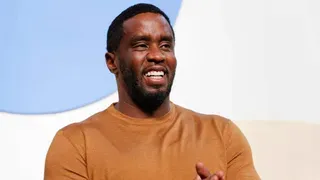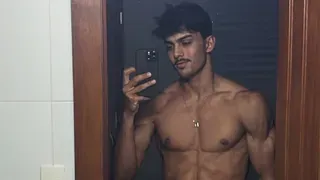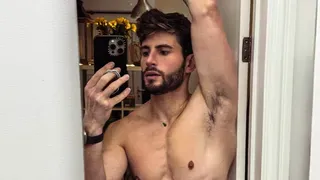July 17, 2013
Around the Festivals :: Bold New Lesbian Drama 'Concussion'
Sean Au READ TIME: 15 MIN.
A concussion, caused by a baseball to the head, sends Abby (Robin Weigert, "Deadwood") on a life-changing journey. Thought to be content in her relationship with her wife Kate (Julie Fain Lawrence), the 40-ish soccer mom begins exploring the dormant side of her sexuality, first by hiring a few call girls; then, egged on by her studly co-worker Justin (Johnathan Tchaikovsky), creating an alter-ego (named Eleanor) and turning tricks herself.
The couple and their two children live a seemingly idyllic life in an affluent New York City suburb. But the baseball-to-the-head (which was thrown by her son) acts as a catalyst for Abby to explore the sexuality missing in her marriage, raising the question: Is it wrong to look beyond a seemingly perfect marriage and family? Writer/director Stacie Passon's debut features questions how far a woman goes in a search for elusive fulfillment.
"The movie is a silky, high-toned thing: 'Belle du Jour' meets 'The L Word' meets 'fortysomething,'" wrote Entertainment Weekly's Lisa Schwarzbaum after its Sundance premiere earlier this year." You've never seen so many beautiful women-who-love-women, and such fine fashion choices."
"Concussion" won the Teddy Jury Award devoted to gay-themed movies at this year's Berlin Film Festival. Most recently, picked up a First Feature Honorable Feature at San Francisco's Frameline LGBT Film Festival.
Scott Foundas [at the time with the Village Voice; now with Variety] calls the film superb: "The movie's true subject is a problem -- the loss of passion -- that can happen in any relationship, and (Director Stacie) Passon addresses it in a series of smart, funny and surprising ways." Variety's Rob Nelson praises Weigert in her first anchor performance, "Acquitting herself capably in a lead role that strips her bare in more ways than one, Robin Weigert proves worthy of a future in features."
EDGE sits down with Robin Weigert and Johnathan Tchaikovsky about their breakthrough roles in the character-driven drama. Television audiences will likely remember Weigert from her portrayal of Calamity Jane on "Deadwood," while the strikingly handsome Tchaikovsky looks to be an actor to watch in the future.
A scary decision
EDGE: How did you get on board 'Concussion?'
Robin Weigert: I was offered the part, which is unusual in my life. I have never met Stacie Passon. Someone sent me the script. But it scared me. I met with Stacie and really liked her, but there was still a period where I was on the fence because if it was not made well, I would be hugely out there. I was telling myself that I should probably not do this project because of how exposed I would be physically. I just did not know how it would be shot. What if it ends up being soft core (porn). What if it ends up being way out there? The themes of the thing would not let me go, I had a couple of actual dreams that I do not remember specifically, where it was clearly at work in my psyche. (And I thought), 'I guess I am working on it already. I guess I have to say yes.'
EDGE: It is like a challenge to know that there are things you would have to overcome?
Robin Weigert: It is something that I have to wrestle with. In my life, in general, when something scares me a certain way as a challenge, it usually means I should do it. This was like that for me for sure.
EDGE: Which part of it scares you?
Robin Weigert: There are some things that are quite apparent, which is I would have to take my clothes off. Other things scare me just as much, if not a lot more: playing someone who is depressed in this way, struggling in this way. I guess I felt fearful carrying an entire film when I begin it with such angst. I wondered if people would be along for the ride. One of the gratifying things first seeing it at Sundance was there was laughter right away, in terms of people clearly hearing, identifying and connecting with the humor. As soon as I heard that laughter, I thought it is going to be okay.
Even during the shooting, I didn't know if some of the emotional tonality would come through the lens of the camera, trusting that very, very tiny things would read and be seen. It was clear from the script, which was sparse, that a lot of the work would be in the ellipsis and in the silences; that kind of tonal piece, that it would be a character study. It would be up to me to fill it up with that kind of life.
EDGE: I feel that Stacie Passon gave the actors a lot of space and time to do what you need to do. You do not feel rushed.
Robin Weigert: She lets you live inside. So much of what we do, especially in television, I find it is, '(snaps fingers) Pace it up! Pace it up!' and you miss so much life to it. I understand there is a certain mandate but I also think that is like an American aesthetic, that is different from some European films I see. You had better move fast so we can move on to the next piece of action. I love that this has got some stillness inside of it.
In a dead zone
EDGE: What would you say is the motivation of Abby, doing what she did?
Robin Weigert: One of the reasons, if the audience is so inclined to forgive her, is that she is just putting one foot in front of the other. It is set up in such a way that you see somebody who simply cannot go on as she has been. She is in a dead zone. She is just a walking dead in a way, inside the life that she has built for herself. It is a very fortunate life; it is an affluent life. She has a beautiful family, a house, children -- all the things that one is supposed to be grateful for. There are people who are channeled into that dream, they achieve their dream and they sit inside for a minute and realize that they life is devastatingly empty. I think she comes upon us all of a sudden. It is a fore sighting incident that she gets hit on the head with a baseball, but psychologically, that is what that moment is. It is just like that song by The Talking Heads, 'This is not my beautiful house. This is not my beautiful life.' One day, you look around and it is all alien.
I like the scenes of just listening to people talk about these banal things that they talk about and feeling like a total stranger insides your own life. What you are watching her do is test out taking one step out of that, and another step out of it, and before you know it, she is way outside of what it would have been her comfort zone, but she's done it one step at a time, only catches up with herself later. It is difficult from somebody setting out with 'I am going to go be a hooker in the afternoon, and that is how that is going to solve my problem.' That would require oversight. She does not have that at this point in her life.
Johnathan Tchaikovsky: I think Robin touches on it beautifully. There is this couple of individuals in the project that has sort of become strangers in a strange land, in a way, they are looking at their life and go, 'I did all this but I really want to shake it up in some way.' For me, the idea of having this older sister-type in my life, indulging me personally, which I do not have in my life. To have someone who has a couple of years of experience on me, who can offer wisdom and guidance and everything. The idea of landing myself in a relationship like that within such a wonderfully human script, allows me to drive toward: okay, how do we shake up our lives? Let's do it together.
Robin Weigert: A good argument can be made about shaking up one's life when one has children and responsibilities that have moral repercussions that are pretty serious. Some making that argument would not be wrong.
Johnathan Tchaikovsky: Justin definitely lends the possibility that here is an exciting opportunity.
Robin Weigert: My character is coming through a late life adolescence. You (to Johnathan) are closer to your real life adolescence and are sort of aiding and abetting.
Johnathan Tchaikovsky: Yes, they come to each other for advice.
Robin Weigert: And that I hand myself over to children to instruct me about how to lead my life is kind of wonderful. Everything gets inverted that way, a way that is very funny.
Johnathan Tchaikovsky: What if you let your little brother tell you what to do for a weeks? That would be exciting.
Robin Weigert: (jokes) That is like the Dalai Lama going to a little blond girl, saying 'What do I do with my life, wise one?' She goes, 'Maybe moisturize.' My character definitely turns herself inside out, and I guess after seeing the movie four times, I think about morality. What is moral and what is immoral for myself quite a lot. I love the line: 'So I only belong to you, but you don't want me,' for the simple fact that it creates the equivalency between these two people. You are not able to say this person cheated on this victimized person and hopefully can be forgiven; but if not, they are done. You cannot just slap it with an easy morality because there are lines that like that acknowledge the complexities of relationships.
Reaching for life
EDGE: Well, she obviously knows that what she is doing is wrong, but there are just so many unfulfilled desires of Abby.
Robin Weigert: She is reaching for life. She is reaching for self. She is reaching for so many things that everybody identifies with that it is hard to begrudge her.
Johnathan Tchaikovsky: I like that there is no villain. We have a tendency to label who is the villain and who is the good guy in a lot of scenarios. This movie portrays that there are times in life when there is no villain, despite the fact that we might want to label someone as that because of their actions. From the outside, it seems villainous, but if you get inside the door and you spend some time with the family, you find out that there is no villain. Everyone is just doing their best, whatever that might be.
Robin Weigert: There is a gain for both characters (Abby and Kate, the couple). They do earn integrity and honesty with one another. That is a gain no matter what happens between them. They do arrive at a point where they are in truth, as opposed to living with a tremendous amount withheld from each other. Those confessions give them a foundation that they could engage and rebuild, or they could decide if they are compatible or not. At least, it gives them a foundation to move forward. So they are out of being stuck by the end of the film.
EDGE: Does Justin see the repercussions of Abby following the advice he gives?
Johnathan Tchaikovsky: There is something wonderful about the arrogance of youth. I think allowing oneself to even go on that roller coaster ride for a little while can open up a lot of honest doors. It can also tear down things which can be scary; but I think if something has a weak foundation, it will not survive, it cannot sustain. Every now and then, someone comes into your life, for Justin, it is also to break his monotony. He is working as a contractor. He is trying to maybe find a girlfriend. He does not really have grandiose dreams. That is my life.
Where I am now has become a part of my life. Acting, interviews, these are all very new. I did not grow up with grandiose dreams. So to relate to that and see someone decide to break that mold, and willing to deal with the consequences of it, maybe even lose the relationship with the person I love. There is something thrilling to say, 'Well, if it does not survive this, it probably never would have.' I love that at the end of this film, all these relationships seem to survive.
Robin Weigert: Life does go on.
Johnathan Tchaikovsky: Maybe egos are completely destroyed, but life still goes on.
Portraying lesbian sex
EDGE: How did you get around filming the sex scenes?
Robin Weigert: Strangely I was not uncomfortable. I had expected to feel more uncomfortable than that way I did. It worked for me every time, by the same set of rules, which was I made it about 'her,' whoever the other woman in the scene was. And because the scenes had to work based on a certain chemistry, I was really going after what that person seems to have energetically that I could resonate with. I would go after that. That would be the sexual dynamic in the scene.
Some of it was certainly dictated by Stacie, but some of these scenes really had nothing but woman number 'fill in the blank' and it was not described yet. We would sometimes, in the car, on the way over, imagining what might serve the story. For example, the one that turns violent, I thought there would be something that would cross the line for her, that she would not want to bring home marks (on her body), something physical. The woman that day was a performance artist. I thought probably, given her job description, she would be willing to go for a lot of things that some others might be squeamish about. So let's see if she is willing to hit and scratch and do that, and then we would be relating to that energy. Once you get started, it takes on a life of its own.
The scene with Maggie (someone in Abby's social circle) was very well written, who was to be on top needed to be exactly like it was written. When my face was held in place so that my eyes are forced to connect, that was written. That scene Stacie has a very clear idea about. It did not frighten me although I feel if I took the reins in that one, it could read as something that it should not. It was different each time.
A raw humanity
EDGE: Since Sundance, has 'Concussion' opened doors for you?
Johnathan Tchaikovsky: It has certainly for me in a lot of wonderful ways but I think that is the result of why I came to be in the first place, for a lot of us. There is such a humanity to it, raw humanity. Meeting Stacie beforehand at least gives me a lot of comfort in meeting that person, that they are willing to write both sides of people, all the angles in the prism and all the colors that it reflects. Meeting her and feeling her ferocity and passion, and everything she had for what people are and why we do what we do. All these combinations and elements brought this vibrant and vigorous production together with all these unbelievably talented people.
Robin Weigert: She is very good in every aspect, choosing people to work with in a way that it was intuition. She found this incredible Director of Photography, David Kruta, who is at the beginning of his career, who is twenty-four or twenty-five years old, who just has such a beautiful eye and such a mature presence. He is such a rock. You would think a twenty-four year old shooting lesbian sex scenes would be out there, but he is the most grounded and centering human being and such a wise soul.
Johnathan Tchaikovsky: That was the way Stacie found all of us, these chess pieces that everyone was geared toward. This is about people living, not what we could be or what we used to be, just what we are right now. That alone has affected the way I approach a script since working on this project. As a result, I got to do six weeks of (Martin Scorsese's) 'The Wolf of Wall Street,' which was incredible.
Robin Weigert: I have got to say this but Johnathan, you have such an amazing career ahead of you because you are such a combination of handsome, sensitive and available, such a team player for all of us. So it is going to be exciting to watch that. I would say for me, it has given me some courage which has a ripple effect on your life altogether, to have said yes to something that frightens me, to have done it, to not have gotten creamed for it, but instead have something positive come back, to have been involved in casting as I did. I feel ultimately empowered. It is not like I am going to get a million casting calls, it is more like within my choices, I am someone who has the right to make choices, I am someone who, if I want to make something happen, I can make something happen. It really has a huge effect on me.
EDGE: What do you wish the audience would get from this movie?
Robin Weigert: I would hope it would allow them to reflect on their own marriages and their own lives in a way that is maybe more forgiving and more dimensional than they might have allowed before seeing the movie. It is very easy for people to assign roles and assign blame. Relationships can just combust over a set of ideas that has nothing to do with what is actually going on between two people. This movie helps to loosen some of that up. It makes you think about things in a more complex and nuanced way. It could actually help people if you allow it.
Johnathan Tchaikovsky: Try to look at your life from the outside and realize that we all have our insecurities and desires, and that is okay.
Concussion is currently on the film festival circuit. It is scheduled for general release in October. For more information visit the film's Facebook page.







